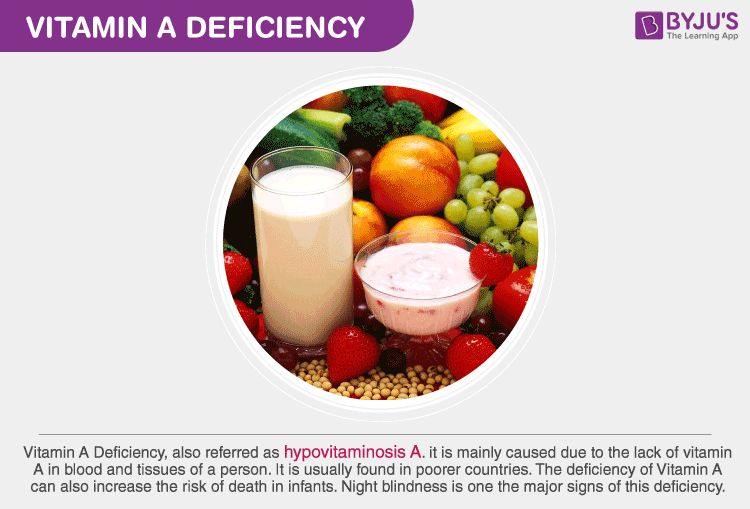Vitamins are essential organic compounds which are required for normal growth and maintenance of our body. They play a vital role in boosting and strengthening the metabolism of living organisms.
Vitamins are also responsible for the breakdown of food molecules during digestion, for the formation of bones, blood cells, hormones, muscles, nerves and genetic materials of our living cells. Deficiency of these vitamins results in certain diseases and disorders.
Let us have an overview of vitamin A deficiency, vitamin A deficiency diseases, its causes, symptoms and treatment.
What is Vitamin A?
Vitamin A is an important vitamin that plays a major role in our vision. It helps in the production of certain pigments that are important for the proper functioning of the retina. Listed below some of the sources of Vitamin A that can be included in our daily diet.
- Nuts.
- Eggs.
- Fish.
- Liver.
- Beet Greens.
- Fortified Margarine.
- Green leafy vegetables.
- Dairy products (cheese, milk, butter)
- Green and ripe yellow colored fruits (mangoes, banana, watermelon, etc.)
- Dark and yellow colored vegetables (Carrots, Pumpkin, Sweet Potatoes,etc.)
What is Vitamin A Deficiency?
Vitamin A deficiency is the major cause of severe diseases, infections and preventable blindness in children. It is one of the major causes of night blindness in pregnant women. It also affects the immune system and results in deaths from malaria, diarrhoea and measles.

Vitamin A Deficiency also results in the growing inability of a body to fight against different types of infections. This results in various diseases. The deficiency of vitamin A severely affects the growth of their bones and also their overall body growth.
Causes of Vitamin A Deficiency
Following are the important causes of vitamin A deficiency:
- Less intake of animal food products and vegetables can cause malnutrition.
- Deficiency of Vitamin A causes over excretion of urine.
- Mothers who do not breastfeed their infants put them at greater risk of Vitamin A deficiency as breast milk consists of a good amount of Vitamin A for a newborn baby.
Also Read: Vitamins and Minerals
Vitamin A Deficiency Diseases
Lack of vitamin A can result in the following deficiency diseases or disorders:
Dry Skin
Vitamin A is responsible for creating and repairing skin cells. Eczema and other skin problems are caused due to vitamin A deficiency that leads to dry, itchy skin.
Dry Eyes
Eye problems are related to vitamin A deficiency. The inability to produce tears is the first sign of vitamin A deficiency.
Night Blindness
Acute vitamin A deficiency results in night blindness. Vitamin A supplements have helped women to adapt to darkness by 50% within six weeks.
Infertility
Vitamin A deficiency results in infertility in both men and women. It is also beneficial for the proper development of babies. It also acts as an antioxidant that is required by infertile men due to oxidative stress in their bodies.
Delayed Growth
Vitamin A is beneficial for the proper growth and development of the body. Deficiency of vitamin A results in stunted growth in children.
Infections in Throat and Chest
Throat and chest infections are also the results of vitamin A deficiency. People who lack vitamin A are more prone to throat and chest infections. However, the supplements of vitamin A in children increase the risk of respiratory infections.
Symptoms of Vitamin A Deficiency
The symptoms of vitamin A deficiency include:
- Dry and rough skin.
- Growth and development can be halted in children.
- Eye inflammation affects the eyelids, surrounding tissues, and even eyes.
- Respiratory infection and urinary infection occurs in children as well as in adults.
- Dry Eyes results in xerophthalmia, which is a risky form of night blindness where the eye’s outer membrane, conjunctiva leaves it’s goblet cells that help in performing the release of mucus in the eye by keeping it lubricated.
- Reduced or less vision in the dim light at the night. Patients with Vitamin A deficiency will not be able to differentiate the outlines of images available in reduced illumination. They have good vision at day time till the night blindness reaches to high form.
- The loss of goblet cells can seriously lead to xerophthalmia where the eye stops developing tears as they become dead cells. These can be collected from the outer layer of the eye and it seems like a form of debris which leads to blindness and other infections.
Also Read: Vitamins Types, Sources and Importance
Stay tuned with BYJU’S to learn more about Vitamin A Deficiency, its causes, symptoms and the diseases associated with it.

Comments